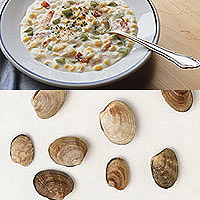Penn Herb Wellness Guide
Clams

Varieties
Abundant varieties of clams can be found along beaches in the United States. The four main kinds of Atlantic clams include hard-shell, soft-shell, surf, and razor. Hard-shell (also call Quahog) are usually sold by size. From small to large, there are the tender and sweet littlenecks, which have shells measuring less than two inches (5cm) across, and are often eaten raw or steamed. A little larger, cherry stones are also quite tender. The largest, chowder and mahogany clams, are often chopped and made into soup. Despite their name, soft-shell clams (also called steamers, fryers, and long necks) have hard, thin shells, with neck-like siphons sticking out of them. Surf clams have large white shells and are usually cut into strips for restaurant use. Razor clams are large, tough clams with shells shaped like straight razors.
Pacific clams include Pacific littlenecks, Manila clams, geoducks, butter clams, and jackknife clams. Pacific littlenecks (not to be confused with Atlantic littlenecks) are small clams suitable for steaming. Manila (Japanese) clams, introduced from Asia, are good steamed or raw. Geoducks (pronounced gooey-ducks) are giant Pacific Northwest clams with siphons that may protrude up to three feet (about 90cm). Butter clams, also native to the Pacific Northwest, are small clams enjoyed raw, steamed, or in stuffing. Western Jackknife clams are similar to East Coast razor clams.
Cockles are not actually clams, but are similar in taste and preparation methods. Mostly imported from New Zealand, cockles are smaller than clams and have a sweet, intense flavor.
Copyright 2025 TraceGains, Inc. All rights reserved.
Learn more about TraceGains, the company.
The information presented in the Food Guide is for informational purposes only and was created by a team of USregistered dietitians and food experts. Consult your doctor, practitioner, and/or pharmacist for any health problem and before using any supplements, making dietary changes, or before making any changes in prescribed medications. Information expires December 2025.


